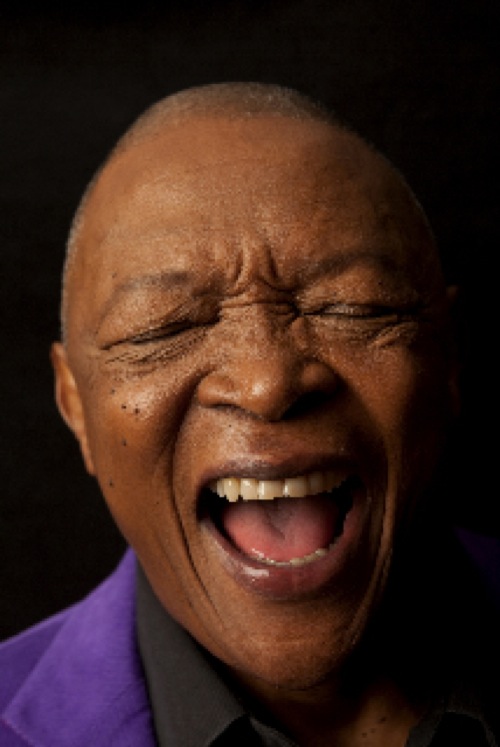
“The six of us leave audiences joyously traumatised”. Hugh Masekela is talking enthusiastically about the band he’s bringing to Grassington Festival this summer, a supergroup of outstanding young musicians in their early twenties alongside veterans of the African jazz scene. This constant quest for new and interesting music and musicians is just one of the many reasons why Masekela – now in his seventies – is revered as one of the world’s best horn players and a genuine music legend. So what’s the secret of his enduring success?
“I have no secrets. I have been a musician for 68 years, music is what I do. Picasso, Miro, Basquiat painted, Fred Astaire and Bojangles danced, Sidney Poitier acted, I make music.”
Masekela first picked up a trumpet aged 14, having seen Kirk Douglas play Bix Beiderbecke in the biopic Young Man with a Horn. Who were his musical influences?
“I have been inspired by every piece of music I’ve ever heard. Even the unbearable songs showed me what to avoid. Elijah Nkwanyana, a genius South African trumpeter, singer and composer was my biggest inspiration during my teens.
Louis Armstrong, Louis Jordan, Harry James, Miriam Makeba, Harry Belafonte, Clifford Brown, Miles Davis, Fela, Franco, Dizzy Gillespie, Marvin Gaye and Billie Holiday also hurled me against their walls; to name a few.”
Along with Miriam Makeba, trumpeter Hugh Masekela brought the music of South Africa to the world during the apartheid era. Helped to leave South Africa in 1960 after the Sharpeville Massacre, he went on to have many chart successes throughout the world, including a Number 1 hit in the United States with Grazin’ in the Grass (a treat for all cowbell fans out there), and over the years has performed with a mind-boggling array of musicians including Paul Simon, Miles Davis and The Byrds. What was it like to return home to South Africa after 30 years in effective exile?
“I was only geographically away from South Africa but my soul remained. It was a gift of the gods and pure spiritual privilege that I was allowed the opportunity to reimmerse myself in the music and heritage of my ancestral land when I went back. The effect this has had is obvious from the way I live my life today and in how I sing and play.”
Over the years Masekela’s music has vividly portrayed his deep love of his home country and the struggles South Africans have endured and he feels a keen responsibility towards how his country is seen by the world. I asked him about the inspiration for his latest studio album, ‘Songs of Migration’
“Songs of Migration was a cast album from a theatre stage play of the same name. I was a member of the cast. We have since recorded two cds: Jabulani is a compilation of traditional wedding songs, Songs of Migration is a compilation of migration folk and choral tunes that I felt South Africans should get to know because they are historical accounts of conditions that led to inevitable migration in the Southern African region because of wars, employment needs, conflict, xenophobia, colonisation and racism.”
A symbol for black South Africans during the apartheid era, Masekela’s single ‘Bring Him Back Home’ became the anthem of the Free Nelson Mandela movement, and he accompanied Mandela on his official visit to Leeds in 2001. He’s also an outspoken critic of contemporary politics and civil rights. Does he feel optimistic about the future of his country?
“The politics of the majority of the world’s countries have become so unrelated to the promises made to their peoples that I have gotten completely ignorant of how or what it is really all about anymore. I would be lying if I had to say it is an area I am still able to comment on.”
Often tagged with the world music label, Masekela’s warm and joyful music incorporates township jazz, afrobeat, hip-hop and funk. As a musician who’s crossed physical as well as musical boundaries during his career does he ever feel burdened by the labels ascribed to him and his music?
“I have never categorised music, having been a musician since infancy. I grew up during a musical environment in which the word genre was an unknown term in relation to the art of music. This enabled me to easily access every manner of song without any prejudice. I have never lived in the categorically congested world of genres and feel badly for those who have been imprisoned by the virus of blinkered musical vision.”
Hugh Masekela headlines the Festival Marquee at Grassington Festival on Tuesday 26th June at 8pm, supported by rising Manchester singer-songwriter Josephine.
I wanted to send you this little word to help say thank you over again for the magnificent tips you’ve documented on this site. It has been certainly surprisingly generous of people like you to grant unreservedly what a few people could have advertised as an ebook to help with making some profit for themselves, specifically now that you might well have tried it in the event you considered necessary. Those points as well served like the fantastic way to realize that some people have similar interest much like mine to learn somewhat more when it comes to this matter. I am sure there are numerous more pleasurable periods in the future for many who start reading your blog post.